Tail Dragger Returns to Jail
James Yancy “Tail Dragger” Jones was confronted by fellow blues musician Bennie “Boston Blackie” Houston in the early morning hours of July 11, 1993 at the Delta Fish Market at Jackson and Kedzie. They had an ongoing dispute about payment at that year’s Chicago Blues
Festival. Blackie had threatened Tail Dragger with a knife and according to 1993 court records, Tail Dragger testified that he shot Blackie in self defense. Blackie was hit in the left eye.
Blackie, 49, died on the scene.
Tail Dragger was convicted of second-degree murder. He served 17 months and three days of a four-year sentence. Tail Dragger first went to Cook County Jail for processing before being dispatched to a minimum security prison in downstate Lincoln.
Tail Dragger, 77, returned to the scene of the time on May 2 when he appeared in a rare concert in the gymnasium of the Mental Health Transition Center at Cook County Jail, 26th and California. Blues legend B.B. King recorded the hit “Live in Cook County Jail” in 1970. But King was never imprisoned like Tail Dragger.
The gig was recorded for a Tail Dragger documentary. There was no other media besides this reporter and a photographer. About 150 inmates attended the show. Many entered the arena handcuffed two by two. They all wore beige DOC jump suits. The highlight of the hour-long
set was when Tail Dragger removed his trademark cowboy hat and sang his hit “My Head is Bald.” The bald and lean blues singer walked towards inmates who sat on bleachers. Tail Dragger eyed a female prison guard and and serenaded her eye to eye. The audience applauded and howled in playful delight. It was a timeless memory in a place where time moves slow.
Tail Dragger wore shiny black snake eel skin cowboy boots he bought at Alcala’s Western Wear in West Town. He was accompanied by long time compatriot Martin Lang on harmonica, Kevin Shanahan on guitar, James Murphy on bass and Dean Haas on drums. Tail Dragger has released four albums, all of them since he left prison. Chess and Sun Records legend Howlin’ Wolf pinned the “Tail Dragger” name on his guitarist because he was always late for gigs.
Christopher “C.J.” Jacobs is program manager for the Cook County Sheriff’s Office Dept. of Corrections. He tries to books quarterly shows at the jail. Past performers have included the blues band Mississippi Heat and the Chicago rock band Where’s Fernando. “The music is therapeutic, visual and about communication,” Jacobs said before the show. Tail Dragger will appear in a more public setting at 5:30 p.m. June 8 at the Chicago Blues Festival’s Front Porch Stage.
Tail Dragger’s story is filled with colorful Chicago history.
His attorney was the iconic public-interest lawyer Marshall Patner. Patner had represented clients as diverse as Jeff Fort and the Blackstone Rangers gang and shareholders at Beatrice Foods. Patner won 1969 arguments before the U.S. Supreme Court that upheld a client’s right to publicly protest persistent segregation in Chicago schools. Patner died in 2000 at the age of 69. He was the father of the late Chicago cultural critic Andrew Patner. Tail Dragger’s sideman Lang was a Hyde Park roommate of Patner’s oldest son Seth. Patner took on Tail Dragger’s case pro bono.
“Fairly early in the trial Patner became convinced that it would be not be possible to convince the jury that Tail Dragger killed Boston Blackie in self defense,” Lang said. “Patner had balls, man. I remember being in the hall of the courtroom where he made the decision to change the plea (to the lesser charge of second degree murder). It was one black guy shooting another black guy on the west side of Chicago. They were blues singers, which made it newsworthy. But it wasn’t gang related or drug related.
“His prediction proved accurate. There were a lot of witnesses to what happened. At one time there would have been as many as 60 people at the fish market. His decision to change the plea probably resulted in Tail Dragger saving a huge amount of time for what he did. He wound up getting time and a half for good behavior. Tail Dragger had a clean record.”
Tail Dragger is known for a shy demeanor off stage, but in a conversation after the jail concert, he explained the fateful night with measured candor. Tail Dragger recalled, “Boston Blackie kept
saying he was going to whip my butt. I ran from him for two weeks. I had seen him cut his own brother. I went to the police but they said they couldn’t do anything because he hadn’t done anything. I was running and everybody was laughing at me. Boston Blackie caught me by myself at the fish market. He didn’t know I had a new pistol. I took it out of my boot and put it in my pocket. I put a half pint of Old Grand-Dad (whiskey) on top of it. And here he came. I was sitting there. He jumped up on the three-foot bandstand with his knife. He took my leg and pulled me off (the bandstand). He was going to show the people how he would whup me in style. So I pulled my pistol out and shot him. The bullet went in the left eye and came out out the top of the head. He was above me so when I shot, it knocked him to the ground. I stepped off the bandstand and got into my pick up truck. I went home, got dressed and turned myself in.”
Now, that’s as real as the blues can get.
Tail Dragger was a model citizen at the Lincoln Correctional Center. He mopped floors, worked in the prison library and had a daily subscription to the Chicago Sun-Times. “Lincoln wasn’t bad,” Tail Dragger said. “It was just a rest home. The only things you missed was whiskey and women. It was kind of hard when I first got out. My wife started going with my bass player while I was in Lincoln. Martin and Rockin’ Johnny (Burgin, guitarist) visited me every month and told me what was going on. So I had a private detective who was a lady friend of mine check out what
was going on at my home.
“So I had time to pray, I had time to cry.”
The incident was also the beginning of the end of the outdoor Delta Fish Market, a linchpin of the west side blues scene.
During the 1970s west side musician and entrepreneur Oliver “Fish Man” Davis imported the best food from near his hometown of Greenville, Miss. He even built tanks to hold live fish. A year after
the shooting, the city bought out Davis and the market closed. Sunnyland Slim, David “Honeyboy” Edwards and Eddie Taylor, Sr. performed at the market in the 1980s. Tail Dragger sang “My Head is Bald” in a 1985 German documentary on the fish market.
Tail Dragger drove semi-tanker trucks to Alabama and Mississippi to pick up fresh catfish and bring them back to Chicago. Lang said, “Tail Dragger and Fish Man would sell them at the fish market and Tail Dragger’s band would play.”
Tail Dragger was born in Altheimer, Ark. where his parents were cotton farmers. He moved to Chicago in 1954. He did a stint with U.S. Army in Fort Polk, La. and then Fort Campbell, Ky. He returned to Chicago in 1966 where he became known on the west side for his cowboy hat and
juke joint numbers like “My Woman is Gone” and “Ain’t Gonna Cry No Mo.” Tail Dragger’s gnarly growl pays homage to his mentor Howln’ Wolf. His band members included the late Jimmy Reed guitarist Eddie Taylor and his son Eddie Taylor, Jr. Tail Dragger did not release his first album until “Crawlin’ Kingsnake” (St. George Records), which came out in 1996.
He was 56 years old and he was a free man.
Lang joined Tail Dragger’s band in 1993. He has been a loyal friend. “Tail Dragger taught me some of the subtler aspects of the music,” Lang said. “He taught me specifically to listen to the drums, play the melody and he would talk at length about blues ‘time’ and how critical an understanding of blues ‘time is.’ He wants his harp deep, dark and heavy. He has changed my life, forever.”
A native of Bridgeport, Ct. who received a philosophy degree at the University of Chicago, Lang learned to play harmonica at the age of six when his mother gave him a Marine band in the key of C. In 1990 he left the harmonica as a tribute at Little Walter’s unmarked grave at St. Mary’s Cemetery in Evergreen Park. The grave now has a marker.
Blues giant Willie Dixon said the blues are the facts of life. Tail Dragger dodged death to have a second chance at life’s offerings. He carried this with him as he looked into the tired eyes of his jail
audience. A sign on the west wall of the gymnasium declared: LIVE TODAY. “I can understand their position because I’ve been there,” he said after the show. “If you’re here, you obey the orders and stay out of trouble. When I was in Lincoln, we’d play dominoes and some guys got that attitude. If you acted up there they’d ship you to another place.
“I came there to do time, not get time.”

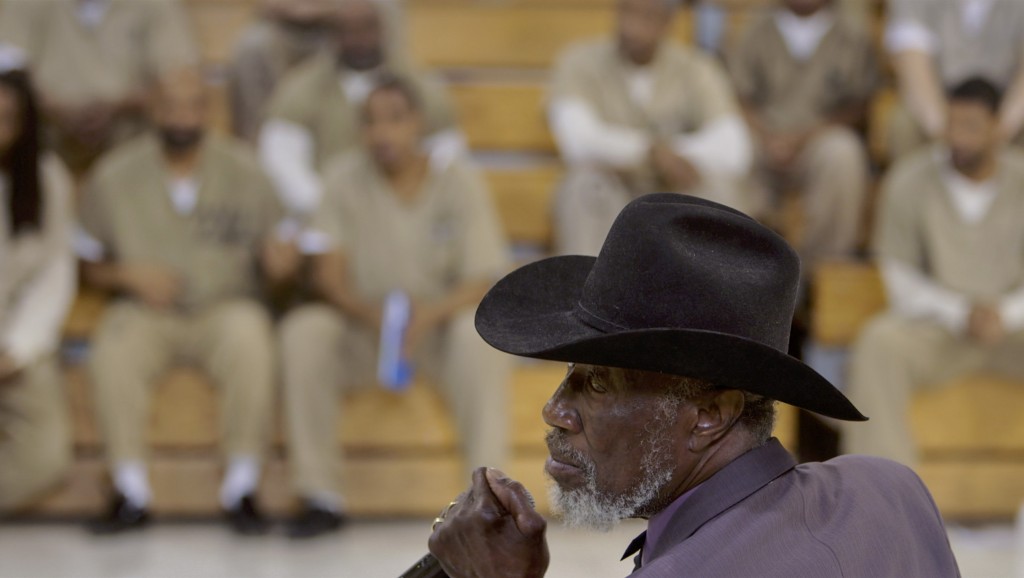
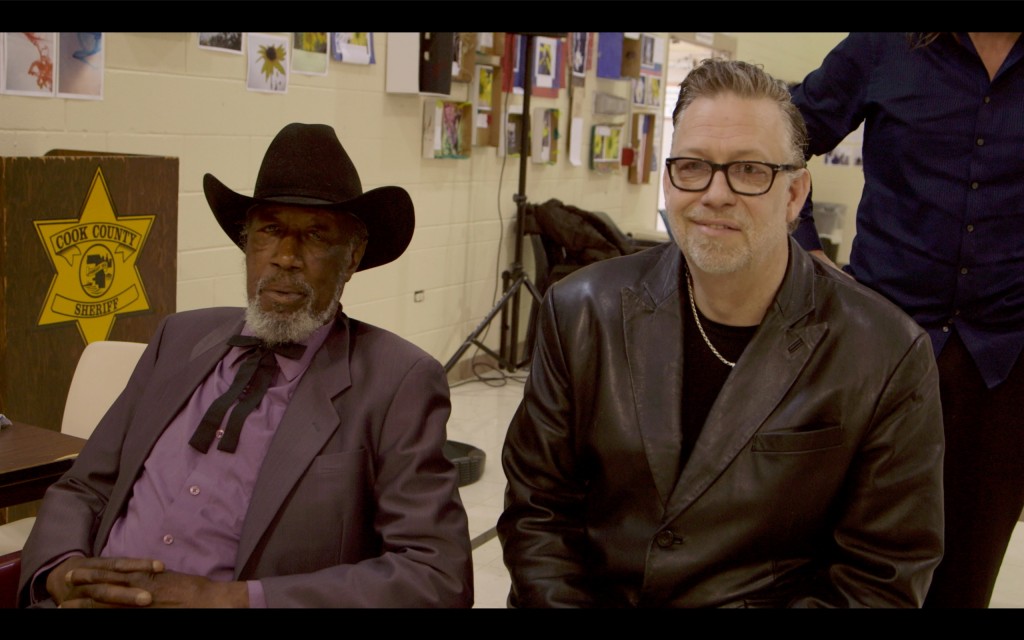
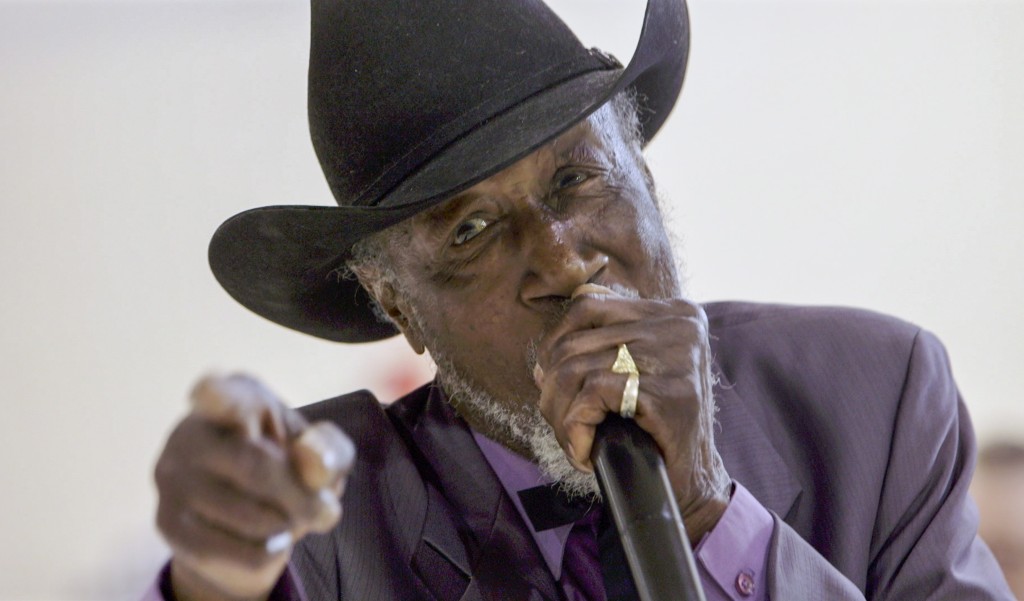
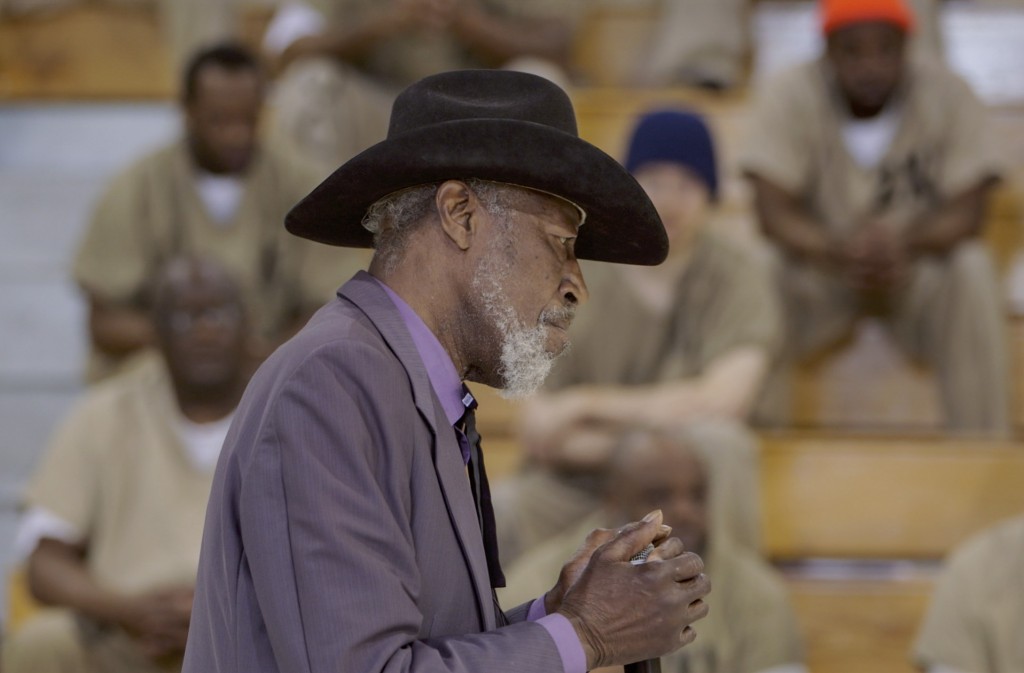
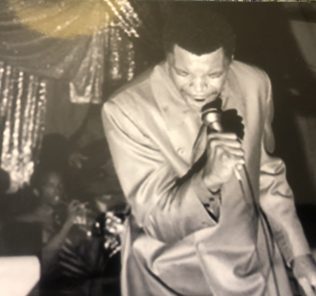
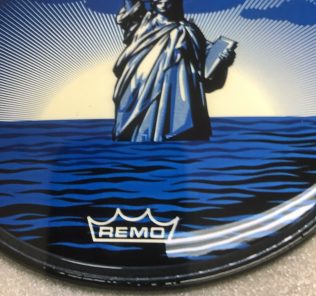

Leave a Response